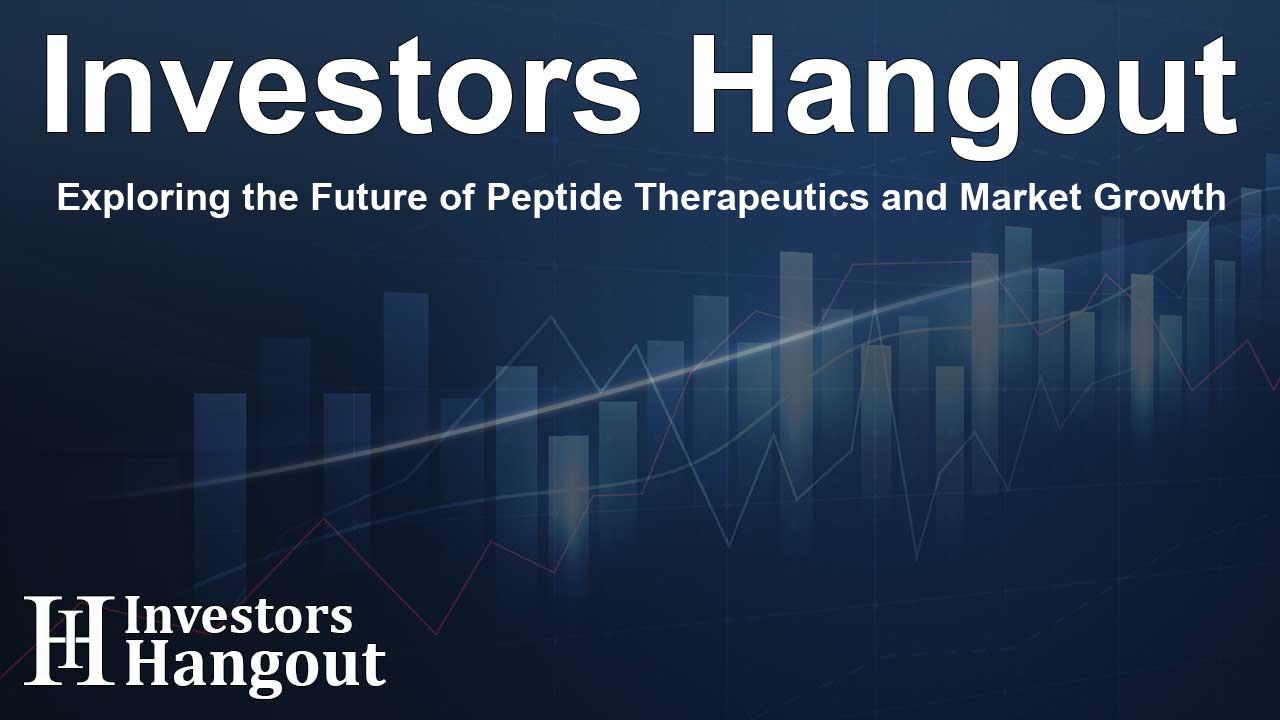Exploring the Future of Peptide Therapeutics and Market Growth

Understanding the Growth of Peptide Therapeutics
Peptide therapeutics have emerged as a revolutionary means of targeting diseases, and their market is witnessing significant growth. With remarkable efficacy and selectivity towards various receptors on target cells, these therapies are reshaping how diseases are treated. They have received market authorization for a multitude of conditions, thereby instilling confidence in their efficacy. As research continues to expand and technology evolves, the global peptide therapeutics market is poised for substantial growth.
Market Dynamics Driving Peptide Therapies
Rising incidences of cancer and metabolic diseases are major factors contributing to the demand for peptide therapies. As more individuals seek out effective treatment options, especially in regions with increasing healthcare needs, the market is set to flourish. This surge is also reflected in the innovations that have been made in peptide synthesis and delivery, which have lowered production costs and led to the development of more complex peptide chains, enhancing therapeutic options available to patients.
Addressing a Growing Health Crisis
According to data from health organizations, chronic diseases such as cancer and diabetes remain prevalent across the globe. As these health problems continue to rise, so does the demand for effective treatment solutions. Peptide therapies offer a new horizon for treating such conditions, making them an attractive option for healthcare providers looking to improve patient outcomes.
Regional Insights into the Peptide Therapeutics Market
North America holds a significant position in the peptide therapeutics market, driven by increased awareness and demand for peptide-based therapies. The biotechnology sector in this region is growing exponentially, supported by government investment in research and development. This growth is critical to sustaining market leadership and meeting the demands of healthcare professionals and patients alike.
Global Market Projections
The global peptide therapeutics market was valued at USD 45.43 billion and is projected to reach USD 76.11 billion by the end of the forecast period. This growth, which represents a compound annual growth rate (CAGR) of 5.90%, highlights the increasing reliance on peptide therapies as viable medical interventions.
Key Players in the Peptide Therapeutics Landscape
Several key players are shaping the peptide therapeutics market, each contributing to innovations and advancements in this space. Companies like Eli Lilly, Pfizer, and Amgen are at the forefront, continuously working to enhance the therapeutic potential of peptides and expand treatment options. Their efforts play a significant role in fostering advancements that facilitate new applications in healthcare.
Innovative Approaches and Recent Developments
Recent developments in this field have shown promise. Innovations such as improvements in drug delivery systems and advancements in peptide design have the potential to enhance the efficacy of treatments. Moreover, the continued exploration of various peptide applications is quickly evolving, offering exciting opportunities for operational efficiencies and increased patient access to crucial therapies.
Challenges and Opportunities in Peptide Therapies
The peptide therapeutics market does face challenges, primarily due to regulatory hurdles and the complexities involved in peptide synthesis. However, the potential for innovation remains high, and the need for new therapies forms a strong basis for future growth. Companies that can navigate these challenges stand to gain a significant competitive edge.
The Road Ahead: Trends and Predictions
Looking forward, the peptide therapeutics market is expected to continue its upward trend, spurred by advances in healthcare technology and persistent demand for more effective treatments. As the industry adapts to changing healthcare landscapes, the role of peptide therapeutics seems only to be growing. This landscape promises exciting developments that could lead to even more revolutionary changes in medical treatment.
Frequently Asked Questions
What are peptide therapeutics?
Peptide therapeutics are medications derived from peptides, which are short chains of amino acids. They are used to treat various diseases by targeting specific receptors in the body.
How is the peptide therapeutics market projected to grow?
The market is projected to grow from USD 45.43 billion to USD 76.11 billion by the end of the forecast period, indicating a robust demand for effective peptide treatments.
What factors are driving the growth of this market?
The rise in chronic diseases, technological advancements, and increased awareness about peptide therapies are significant factors driving market growth.
Who are the major players in the peptide therapeutics market?
Major players include Eli Lilly, Pfizer, and Amgen, among others. These companies are leading advancements in therapy development and market expansion.
What challenges does the peptide therapeutics market face?
Challenges include regulatory issues and complexities in peptide synthesis, but these can be addressed through innovative approaches and partnerships in the field.
About The Author
Contact Thomas Cooper privately here. Or send an email with ATTN: Thomas Cooper as the subject to contact@investorshangout.com.
About Investors Hangout
Investors Hangout is a leading online stock forum for financial discussion and learning, offering a wide range of free tools and resources. It draws in traders of all levels, who exchange market knowledge, investigate trading tactics, and keep an eye on industry developments in real time. Featuring financial articles, stock message boards, quotes, charts, company profiles, and live news updates. Through cooperative learning and a wealth of informational resources, it helps users from novices creating their first portfolios to experts honing their techniques. Join Investors Hangout today: https://investorshangout.com/
The content of this article is based on factual, publicly available information and does not represent legal, financial, or investment advice. Investors Hangout does not offer financial advice, and the author is not a licensed financial advisor. Consult a qualified advisor before making any financial or investment decisions based on this article. This article should not be considered advice to purchase, sell, or hold any securities or other investments. If any of the material provided here is inaccurate, please contact us for corrections.
